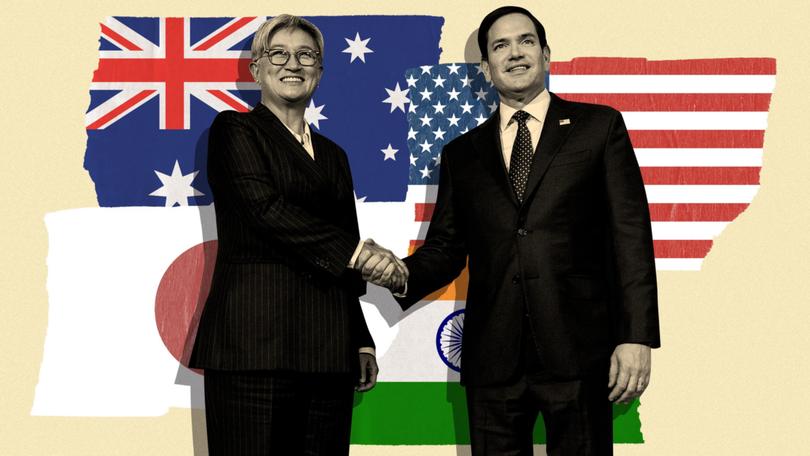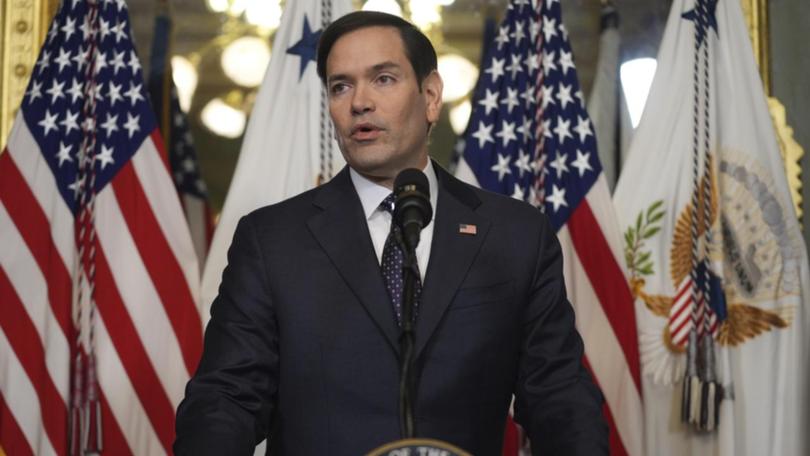LATIKA M BOURKE: Tough language of Quad redirection a ‘welcome evolution’
LATIKA M BOURKE: With just one missive, the Trump administration has shaken off the Quad’s cluttered agenda and redirected the focus to one central aim.

Marco Rubio is not wasting any time.
Confirmed by the Senate in a 99-0 vote on Monday, the US Secretary of State immediately got down to business, hosting his first international meeting that was very much aimed at one country — China.
The foreign ministers of the Quad countries were all invited to attend the inauguration, a first-ever for the three, and on Tuesday they gathered for talks with Rubio.
Sign up to The Nightly's newsletters.
Get the first look at the digital newspaper, curated daily stories and breaking headlines delivered to your inbox.
By continuing you agree to our Terms and Privacy Policy.And what a meeting it was because the four emerged saying less — 162 words to be precise — that gave more intent to the Quad than ever before.
“We, the Secretary of State of the United States and the Foreign Ministers of Australia, India, and Japan, met today in Washington DC to reaffirm our shared commitment to strengthening a free and open Indo-Pacific where the rule of law, democratic values, sovereignty, and territorial integrity are upheld and defended,” the quartet said.
“Our four nations maintain our conviction that international law, economic opportunity, peace, stability, and security in all domains including the maritime domain underpin the development and prosperity of the peoples of the Indo-Pacific.
“We also strongly oppose any unilateral actions that seek to change the status quo by force or coercion.”
Coupled with this, buried deep in one of his many inauguration-day executive orders, US President Donald Trump referred to the grouping as “The Quadrilateral Security Dialogue”.
“Secretary Rubio has made a very telling first move in sharpening regional security arrangements, and his demonstration of US leadership in this regard is very welcome,” Mike Pezzullo, who wrote Australia’s 2009 Defence White Paper and served as Secretary at the Department of Home Affairs told The Nightly.
“It explicitly embraces security issues as being central to the Quad’s rationale and purpose,” he said.
“The explicit reference to opposing the use of force or coercion in the regional is especially welcome in this regard.
“It is a most welcome evolution.”
Professor Harsh Pant from India’s influential Observer Research Foundation think tank which hosts the Raisina Dialogue, said there was no doubt the toughened language was Trump’s work.
“The way it has panned out certainly has the imprint of the United States and the Trump Administration,” Professor Pant said in an interview from Delhi by phone.
He said it was part of an overall tapestry Trump was weaving in relation to China, which included threats of tariffs, the love-in over TikTok, and now the stick in beefing up the Quad.
Asked how it would be received in India, he said that while India had wanted to do business with China, other than resolving tensions over the border dispute late last year, China had not given India much more range to expand the relationship.

Combined with the “open transactionalism” of the Trump Administration, this meant that if push came to shove, India would be unlikely to push back.
“There was a very cautious approach by the Biden Administration because they thought countries like India might be comfortable with ambiguity,” he said.
“But with Trump India will find it difficult to say no.”
S. Jaishankar, India’s External Foreign Minister Affairs minister described it as “taking the Quad further”.
“It’s important to refresh it, keep doing more, to keep adding substance,” he told reporters in DC on Wednesday.
While India opted for ambiguity, Australia, under Labor, feigned denial.
“The partnership is known formally as the “Quad”, not the Quadrilateral Security Dialogue, noting its nature as a diplomatic, not security, partnership,” Labor added to the Department of Foreign Affairs website after its election in 2022.
Why this is all so significant is explained by the Quad’s history.
The four countries first came together in the aftermath of the 2004 Boxing Day tsunami to deliver aid to the region.
But Japan’s Shinzo Abe wanted more.
Earlier than most to realise the threat China was posing to the international order, he wanted to formalise the Quadrilateral grouping. It met in 2007 but went nowhere.
And in 2008, the Mandarin-speaking Kevin Rudd, who currently serves as Australia’s Ambassador to the United States, helped nix it all together when he became Prime Minister.
Rudd’s then foreign minister Stephen Smith, who is now Australia’s High Commissioner to the UK, said in 2009 that Australia was not proposing to add India to the trilateral it already had with the US and Japan.
That Labor government blocked Australian sales of uranium to India and took Japan to the International Court over whaling.
China which overtook Japan as Australia’s largest trading partner in 2007 was, by contrast, very much seen as the key to Australia’s prosperity.
“China . . . was delighted when, in 2008, Kevin Rudd pulled out of it,” Malcolm Turnbull, who served as Prime Minister between 2015 and 2018, wrote in his memoir A Bigger Picture.
Turnbull was leader when the Quad landscape changed. Abe was back in power in Japan and this time he had an important friend in the White House — Donald Trump.

Trump had two of the United States’ most active China hawks in his Administration — former CIA Director and then US Secretary of State Mike Pompeo and Deputy National Security Adviser Matt Pottinger who were key drivers in getting the dialogue to the foreign ministers level with Australia’s then Foreign Minister Marise Payne and India’s S. Jaishanker.
A decade later, Abe’s dream was finally taking shape in Quad 2.0.
In 2021 the Quad leaders, under Biden, held their first meeting but because of the COVID pandemic, which originated in Wuhan, China, it was online — but it was the first of now annual leader-level meetings.
But despite the priority given to it, the Quad has always had an overhang of ambivalence and struggled to say what it meant.
Because of that, a dizzying number and array of items were placed on its agenda.
The 2021 statement, for example, included pledges to focus on: cyberspace, critical technologies, counter-terrorism, quality infrastructure investment, disaster relief, maritime domains, green hydrogen, climate change, vaccines, student scholarships and more.
The overload peaked last year when former US Ambassador Caroline Kennedy revealed the White House was scouting for ideas for Joe Biden’s final summit as US President.
“We had one . . . the Quad Cancer Moonshot,” she told the National Press Club in Canberra in her outgoing address.
However noble trying to tackle these problems might be, the Quad’s agenda was crammed, nonsensically, and with few outcomes to show.
And so it risked languishing.
Until Donald Trump’s inauguration on Monday.
In their first working days in office, Trump and Rubio unequivocally called it a security dialogue and said it would defend, and not just uphold, sovereignty, and territorial integrity.
There was no mention of ambitions on things like green hydrogen, climate change, global health or the inclusion of ASEAN centrality — the deference to the idea that the ineffectual ASEAN group should drive the region’s architecture — just a clear show of intent that the Quad now stands for security.
It’s not quite saying the Quad will morph into a defence network but it is certainly edging there and closer defence cooperation is a natural path for it to take given the four navies will exercise together in Exercise Malabar.
Marco Rubio had a good first day in the office.
This is an early and promising example of what America First+ allies can look like.
One of Donald Trump’s obvious strengths is his plain speaking. Now he needs to match it with action.

